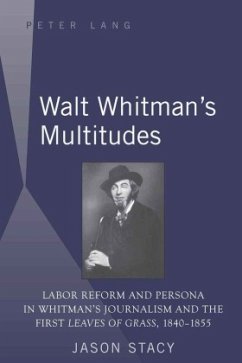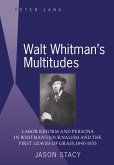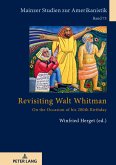In the fifteen years before the publication of Leaves of Grass (1855), Walt Whitman constructed three authoritative voices by which he engaged the upheavals endemic to the Industrial Revolution. Through these public personas, found mostly in his journalism, Whitman offered remedies for American artisans who had lost their economic autonomy and status. Instead of attacking broad forces beyond worker control, Whitman blamed artisans for oppressing themselves through the temptations of consumerism and affectation. Walt Whitman's Multitudes places the first edition of Leaves of Grass on par with Whitman's journalism and exposes a writer different from most poetry-directed analyses. In doing so, it traces Whitman's public voice as he wrestled intimately with the debates of his day: conspicuous consumption, nativism, slavery, and, through it all, labor and the status of the new working class.
«I applaud the resourceful use of the journalism in this study. Writings that have generally been dismissed or only treated as incidental evidence are here taken seriously, thus restoring the importance they had to Whitman at the time.» (Douglas Noverr, Professor of American Cultures, Michigan State University; Co-editor, 'The Collected Writings of Walt Whitman: The Journalism' (Lang, 2003))
«As a teacher, a journalist, and finally a poet, young Walt Whitman endeavored to comprehend the confusing cacophony called the United States. The contradictions of the market-driven antebellum society perplexed the bard: superficial fashion versus sincere belief, prudish morality versus sexual liberation, conservative reform versus radical transformation. Jason Stacy reveals Whitman was more than a bourgeois mystic or hypocritical radical, offering a compelling reinterpretation of Whitman's formative years. 'Walt Whitman's Multitudes' will be required reading for not only Whitman scholars but all students of the early American republic.» (Timothy Gilfoyle, Professor of History, Loyola University Chicago; Associate Editor, 'Journal of Urban History')
«Part labor history, part biography, and part rhetorical analysis, Jason Stacy's exciting new book offers the most complete reading to date of Whitman's important early journalism. This is a book where things like the Maclay Bill, the Wilmot Proviso, Hunkers and Barnburners, the Walker Tariff, the 'sewing girls' strike, and the collapse of the artistic patronage system in the Panic of 1837 all play key roles in the development of Whitman's voice, aesthetics, and politics, leading to a richly historicized, fresh view of the inception of 'Leaves of Grass'. By offering an illuminating examination of Whitman's three earliest personae - Schoolmaster, Editor, and Bard - Stacy explains how each guise was entwined with the poet's evolving struggle to define labor, aesthetics, and social hierarchy in a democratic context. Stacy shows how Whitman thoroughly engaged the divisive political issues of his times but always assumed the unifying voice of American natural rights; trying to speak for everyone in an increasingly divided nation finally left him, as the Teacher and the Editor, with no voice, speaking to no one, and prompted him to become the Bard, who could teach everyone how his or her unique place in the society was equal to every other place. Along the way, Stacy offers convincing explanations of a number of seeming contradictions in Whitman's early writings that have puzzled critics for decades. Stacy's striking conclusion offers an overview of the adaptations Whitman made to his Bard persona in his 1856 and 1860 editions of Leaves, including his return to his Editor persona in his anonymous reviews of his Bard persona, as he assumed the role of the unaffected artist he had once argued for as the Editor. This book builds upon the work of critics like M. Wynn Thomas and David Reynolds, and it adds significantly to our understanding of how Whitman's 'Leaves of Grass' emerged from a specific set of decisive and often forgotten moments in American social history.» (Ed Folsom, Editor, 'Walt Whitman Quarterly Review')
«As a teacher, a journalist, and finally a poet, young Walt Whitman endeavored to comprehend the confusing cacophony called the United States. The contradictions of the market-driven antebellum society perplexed the bard: superficial fashion versus sincere belief, prudish morality versus sexual liberation, conservative reform versus radical transformation. Jason Stacy reveals Whitman was more than a bourgeois mystic or hypocritical radical, offering a compelling reinterpretation of Whitman's formative years. 'Walt Whitman's Multitudes' will be required reading for not only Whitman scholars but all students of the early American republic.» (Timothy Gilfoyle, Professor of History, Loyola University Chicago; Associate Editor, 'Journal of Urban History')
«Part labor history, part biography, and part rhetorical analysis, Jason Stacy's exciting new book offers the most complete reading to date of Whitman's important early journalism. This is a book where things like the Maclay Bill, the Wilmot Proviso, Hunkers and Barnburners, the Walker Tariff, the 'sewing girls' strike, and the collapse of the artistic patronage system in the Panic of 1837 all play key roles in the development of Whitman's voice, aesthetics, and politics, leading to a richly historicized, fresh view of the inception of 'Leaves of Grass'. By offering an illuminating examination of Whitman's three earliest personae - Schoolmaster, Editor, and Bard - Stacy explains how each guise was entwined with the poet's evolving struggle to define labor, aesthetics, and social hierarchy in a democratic context. Stacy shows how Whitman thoroughly engaged the divisive political issues of his times but always assumed the unifying voice of American natural rights; trying to speak for everyone in an increasingly divided nation finally left him, as the Teacher and the Editor, with no voice, speaking to no one, and prompted him to become the Bard, who could teach everyone how his or her unique place in the society was equal to every other place. Along the way, Stacy offers convincing explanations of a number of seeming contradictions in Whitman's early writings that have puzzled critics for decades. Stacy's striking conclusion offers an overview of the adaptations Whitman made to his Bard persona in his 1856 and 1860 editions of Leaves, including his return to his Editor persona in his anonymous reviews of his Bard persona, as he assumed the role of the unaffected artist he had once argued for as the Editor. This book builds upon the work of critics like M. Wynn Thomas and David Reynolds, and it adds significantly to our understanding of how Whitman's 'Leaves of Grass' emerged from a specific set of decisive and often forgotten moments in American social history.» (Ed Folsom, Editor, 'Walt Whitman Quarterly Review')








